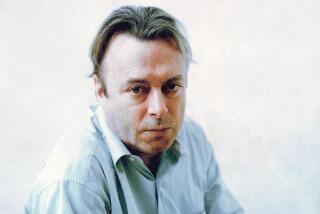Christopher Hill, 91; Marxist Shone New Light on Britain’s Revolution
- Share via
Christopher Hill, a Marxist historian whose reinterpretation of the 17th century changed the way Britons regard the English revolution, has died. He was 91.
Hill died Monday, said a spokesman for Oxford University’s Balliol College, where Hill was master from 1965 to 1978. No place or cause of death was given.
“No historian of recent times was so synonymous with his period of study; he is the reason why most of us know anything about the 17th century at all,” the Guardian wrote in an obituary published Wednesday.
In books such as “The World Turned Upside Down” (1972), Hill reclaimed a largely forgotten radical tradition, exploring the many groups -- including Diggers, Ranters and Levelers -- that challenged the monarchy in the 17th century.
Born in the northeastern English city of York, Hill attended that city’s St. Peter’s School before studying at Balliol College. It was the start of an academic association that ended 47 years later when he retired as master.
He read Marx as an undergraduate -- the period of the Great Depression, America’s New Deal and the rise of Adolf Hitler -- but remained vague about the timing of his conversion to Marxism.
But by the time he graduated he had joined the Communist Party, and he spent 1935 in the Soviet Union, where he became enamored of Russian life, although not Soviet politics.
On his return, he worked for two years as an assistant lecturer at University College, Cardiff, before returning to Balliol as a fellow and tutor in modern history.
During World War II, Hill joined the army’s intelligence corps and was transferred to the Foreign Office.
In 1940, he published his essay “The English Revolution 1640,” a hard-hitting look at revolutionary pressures in England after 1640, when parliamentary forces overthrew the monarchy. In it, he challenged the traditional view that those years were just an aberration in the stately progress of English history.
The discussions that followed led to the creation in 1946 of the Communist Party Historians Group, which included Eric Hobsbawn, James Jeffreys, Maurice Dobb and Edmund Dell.
The group helped to redefine the study of history in Britain and generated such pioneering documents as “The Good Old Cause,” which Hill edited with Dell in 1949.
After the Soviet invasion of Hungary in 1956, Hill became frustrated with the Communist Party’s reluctance to criticize the Soviet Union and later broke with it.
During the war, he had married Inez Waugh. The marriage collapsed early and Hill married Bridget Sutton, then a history tutor with the Workers’ Educational Assn.
Under his mastership, Balliol was finally opened to female students, and students gained representation on the college’s governing body.
Hill’s second wife died in 2002. He is survived by their son and a daughter.
More to Read
Sign up for Essential California
The most important California stories and recommendations in your inbox every morning.
You may occasionally receive promotional content from the Los Angeles Times.










